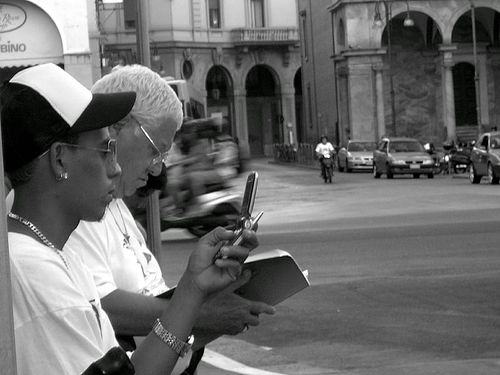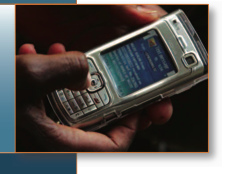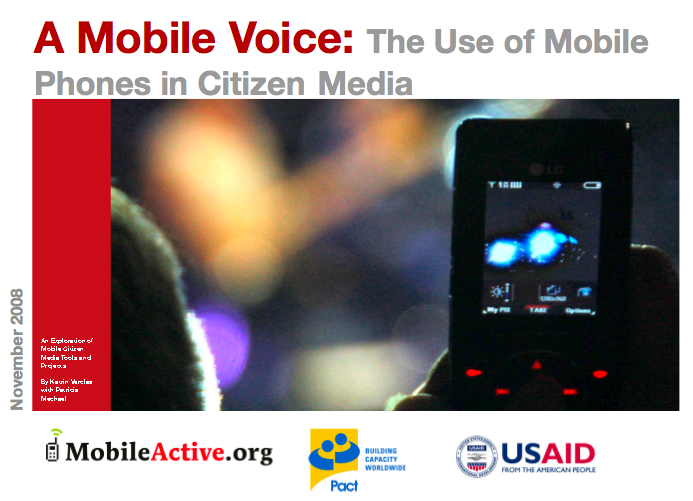 Amnesty's campaign to close Guatanamo using SMS has been bothering me ever since I opted in to the mobile action network. Don't get me wrong - the web campaign is great and the pictures and stories on the blog are effective.
Amnesty's campaign to close Guatanamo using SMS has been bothering me ever since I opted in to the mobile action network. Don't get me wrong - the web campaign is great and the pictures and stories on the blog are effective.
But the mobile campaign is all wrong. Yes, mobile campaigns are a new medium, only beginning to show a return, and not well understood. This is even true for big commercial campaigns that are only now sticking their toes into the mobile marketing waters.
But come on, advocacy organization, you are smarter than that. Mobile marketing is not rocket science, there is already a lot we know, and even as you experiment, use some common sense and pay attention to what you already know about engaging users and constituents.
So in order:
1. What's happening in the mobile marketing market that advocacy organizations should pay attention to (caution: this is US-centric!)
- Carriers in the US are loosening up their previously tight restrictions on mobile advertising. Verizon, Sprint/Nextel, and AT&T are now allowing banner ads on their landing pages
- More and more Americans have WAP-enabled phones, allowing them to do more and more on their cell phones, including watching video and photos, browsing the web, and of course, ubiquitous text messaging. rich media mobile messaging for greater brand and communication impact. Marketers now have at their disposal MMS (define), WAP push (clickable links to WAP-based multimedia content incorporated into SMS messages), and video shortcodes (consumers receive a video stream directly to their handset in response to texting to a shortcode).
- Altogether more than 74% of US adults have cell phones -- and they do not leave the house without them (and their keys and wallets - the three things most adults walk around with at all times.)
- Sms/texting is growing by leaps and bounds with more than 64.8 billion SMS messages sent in the first six months of 2006, up 98.8% from 32.6 billion in first six months of 2005.
- Mobile marketers are salivating, with polls, contests, coupons, and even mobi-sodes, short sms serial stories hitting the commercial market. Pepsi, Ford, Toyota, Burger King all have mobile campaigns, and more and more marketers are allocating hard dollars to "mobile marketing" budgets.
- Visa announced its mobile payment platform, allowing cardholders to use their mobile phones to make purchases or conduct other transactions by tapping them against readers. Think 'just in time' fundraising.
But what's the ROI for mobile marketers - such as advocacy organizations?
Everyone agrees, the medium is young, it is risky when poorly done, and it'll take time to judge payoffs. MobileActive's research of existing campaigns shows some interesting returns with sizeable opt-ins, and rather impressive open and forward rates for campaigns conducted by IFAW and Oxfam, for example. We will be publishing more details from specific campaigns in the next MobileActive Guide on Mobile Advocacy.
While a lot of metrics are still elusive, Brandweek reports about a commercial campaign: For the "Everydayrocks" text initiative, some 13,000 people opted in. And more than 75% of the entrants responded to SMS messages from the brand and/or redeemed mobile coupons. Only 4.8% opted out. Most telling, however, was that mobile emerged as the conduit with the best market reach; mobile outperformed radio by more than 64% and billboards by 24%. Overall, the mobile redemption rate was 28%, making it by far the most effective component."
We have seen positive other PR as well - a clever campaign, especially one that goes viral, will get earned media coverage and word-of-mouth exposure
What are advocacy organizations concerned about?
According to Brandweek, there still is considerable "consumer resistance, the main reason behind the carriers' historic refusal to open the gates to ad content." Brandweek goes on: "Studies have shown that consumers are less than thrilled with the idea of receiving ads on their cells. While early adopter teens are among the biggest targets, three-quarters of cell phone users ages 10 to 18 said they do not think it's OK to be marketed to on a mobile device, according to a study of 2,000 users conducted by Weekly Reader Research, Stamford, Conn., on Brandweek's behalf. Forrester Research in Cambridge, Mass., found 79% of consumers are turned off by the idea of ads on their phones and a mere 3% of respondents said they trust text ads."
There are now strict guidelines, drafted by the Mobile Marketing Association, on opt-in and opt out procedures.
It's my phone! Be scrupulous about your opt-in practices, absolutely meticulous in following the mobile marketing code of ethics, and make your vendors follow them to the T. Your brand is at stake, and people will get very annoyed if they perceive you spamming them.
But this is not stopping mobile marketers who are chomping at the bit.
So, what do we know about effective mobile marketing?
Can we talk?
1. Mobile messaging should be about interaction, do not just pitch. A hard notion for advocacy organizations used to pushing email messages by the millions. Mobiles offer a unique opportunity for interaction. Advocacy organizations need to think about mobile marketing as a conversation, a way to interact two-ways with their constituents.
2. Trust is key here as the mobile medium is so very personal. Gain permission and offer relevant and timely content.
3. Pull people to mobile interaction through other media -- ads, billboards, the web and offer, in turn, mobile interaction with those media.
4. Be careful about targeting your demographics and make your ask accordingly -- asking an older constituency to upload mobile photos is probably not going to be very successful.
5. Be relevant. Offer timely news and functional updates that are of interest to your audience-- and be clever. Just by way of an idea: The American Lung Association could offer air quality updates via sms for where I live, for example. In Amnesty's case, I would like to know how many others are signing the petition and how it's going -- what are others saying and how successful is the campaign? Send me an sms with an update since signing on -- I have not heard a lick from Amnesty since I signed the petition two days ago.
6. Mobile marketing works best when it's pull, not push, and there is an opportunity for people to express themselves - to 'talk' back, to suggest, to respond. Humor works here!
7. Be multi-media. Integrate your mobile marketing and messaging into your entire media and messaging campaing; do not let mobile be an add-on - it shows, and it costs you if not done well.
This is a world that is rapidly evolving. Bandwith and technology improving al the time, we will see Internet- and TV-style ads, search, and much more branded content.
For advocacy organizations, mobile marketing is used most effectively for facilitating a dialogue with their constituents. This 'third screen' can create extended conversation, creating connections across online and traditional media exposures.
So what should Amnesty have done better here?
1. Do no ask me for my email to sign the petition, let me do it via sms.
2. Show what people are saying on the petition via sms, in real time on the blog, in ads, in public interest announcements -- in your other media campaign.
3. Tell me back how it is going -- what other people are saying, what is happening.
4. Communicate regularly with me VIA text, BUT remind me of how to opt out.
5. Ask me to forward a note, ask me to make a call, ask me to express myself in a some way in a poll, in a 160 character message, poem or statement.
6. Use humour, allow for humour -- it may be gallows humour in the case of Gitmo, but hey...
Overall: engage me, and do not let me feel that I am sinking in your typical advocacy 'push' hole that benefits you organizationally, but in the end has no impact on the issue, nor engages me in any way.
In the end, because mobiles are so personal, there is a huge opportunity for a conversation that few advocacy organizations used to messaging OUT have any idea how to do effectively. Mobiles are very much a read/write medium in the web 2.0 fashion and only those organizations willing to hear back and engage in 'it's the conversation, stupid' will end up running catchy, creative, engaging, and innovative mobile campaigns.
Read More >>













 I am part of a research project for the Gates Foundation on the future of global online advocacy, where I have been adding data and commentary on mobile content. One of the ideas we have floated is a global SMS hub – a commercial aggregator for low cost global SMS campaigns.
I am part of a research project for the Gates Foundation on the future of global online advocacy, where I have been adding data and commentary on mobile content. One of the ideas we have floated is a global SMS hub – a commercial aggregator for low cost global SMS campaigns.  MobileActive is recognized by Squidoo, GetActive (now Convio) and Netsquared as one of the
MobileActive is recognized by Squidoo, GetActive (now Convio) and Netsquared as one of the  Mobile banking is taking off, with the potential to change entire economies where the majority of people currently are currently "unbanked," as the term goes. There have been been several very interesting reports and articles recently on the topic. On the
Mobile banking is taking off, with the potential to change entire economies where the majority of people currently are currently "unbanked," as the term goes. There have been been several very interesting reports and articles recently on the topic. On the 



